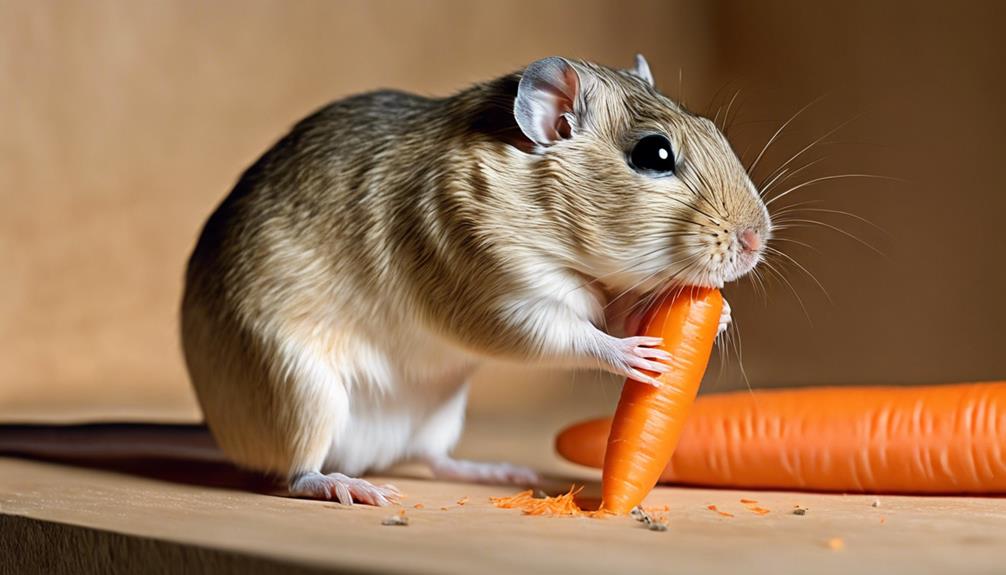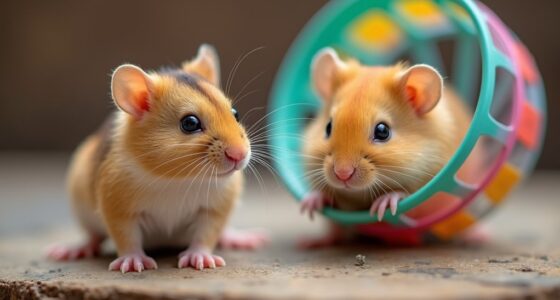Social media has shown how gerbils can outsmart lab mazes with new training techniques and environmental enrichment. By engaging in reward-based routines and introducing varied maze challenges, they actively develop problem-solving skills. Trainers share videos and tips that foster mental agility and pattern recognition. As you explore this topic further, you’ll discover how social media continues to inspire innovative ways to boost gerbils’ intelligence and cognitive growth. Keep going to uncover these fascinating insights.
Key Takeaways
- Social media shares innovative training techniques that enhance gerbils’ maze-solving skills through positive reinforcement and mental stimulation.
- Online communities facilitate the exchange of successful strategies, accelerating gerbils’ learning and recognition of patterns.
- Exposure to varied maze layouts via social media prevents habituation, promoting adaptability and problem-solving abilities.
- Sharing behavioral insights online highlights gerbils’ capacity to recall routes and recognize shortcuts, boosting their cognitive performance.
- Enriched environments inspired by social media content support natural problem-solving instincts, leading to smarter maze navigation.

Gerbils have proven to be surprisingly clever when it comes to traversing lab mazes, often outsmarting researchers’ expectations. Their ability to navigate complex environments isn’t purely instinctual; it’s influenced heavily by their cognitive development and the training techniques used to enhance their problem-solving skills. Recent studies and observations suggest that social media has played an unexpected role in this process. By sharing innovative training methods and behavioral insights, scientists and pet owners alike have sparked a new wave of curiosity about how gerbils learn and adapt.
Gerbils’ clever maze navigation is boosted by social media-shared training techniques and behavioral insights.
When you focus on training techniques that stimulate a gerbil’s cognitive development, you tap into their natural curiosity and mental agility. These animals aren’t just running through mazes randomly; they’re actively learning from each experience. Techniques like positive reinforcement, where you reward correct choices, help improve their memory and decision-making skills. Over time, gerbils start recognizing patterns and shortcuts, which allows them to complete mazes more efficiently. The key is consistency and patience, encouraging them to explore and solve puzzles at their own pace.
Social media has accelerated the dissemination of these successful training techniques. Pet trainers and researchers post videos demonstrating how to set up engaging maze challenges that enhance cognitive development. Watching these videos, you can pick up practical tips, such as varying maze layouts to prevent habituation or introducing novel elements to stimulate mental flexibility. These online communities provide a platform for sharing trial-and-error experiences, helping you refine your approach. As a result, you get inspired to develop more sophisticated training routines that push your gerbil’s cognitive limits.
What’s remarkable is how social media has also fostered a broader understanding of animal intelligence. You see stories of gerbils not just running mazes but actually solving problems, recalling routes, or even communicating with handlers in subtle ways. This collective knowledge pushes you to think beyond traditional training and consider how social interactions and environmental enrichment can boost your pet’s mental development. It’s no longer about just keeping gerbils physically active but actively engaging their minds. Additionally, cognitive development can be further supported by providing an enriched environment that stimulates their natural problem-solving instincts.
Frequently Asked Questions
How Do Gerbils Learn Maze Navigation Through Social Media?
You might wonder how gerbils learn maze navigation through social media. By observing videos and shared content, they experience behavioral conditioning, where positive feedback reinforces their actions. Digital influence exposes them to new strategies and cues, helping them associate certain signals with successful navigation. This interaction accelerates their learning process, making them smarter at solving mazes as they adapt based on what they see and imitate online.
What Specific Social Media Platforms Are Used for Gerbil Training?
You use social media platforms like Facebook and YouTube to find video tutorials and join social media groups dedicated to gerbil training. These platforms offer valuable resources where trainers share tips, demonstrate maze navigation techniques, and exchange experiences. By actively engaging in these groups and watching tutorials, you can effectively teach your gerbils maze skills and improve their problem-solving abilities through shared knowledge and visual guidance.
Can Other Small Animals Benefit From Social Media-Based Training Methods?
Imagine teaching your pet a new trick as easily as sharing a viral video—social media can unlock animal cognition in small animals beyond gerbils. With proper training ethics, other small pets like hamsters or mice can benefit from quick, engaging methods. Social media offers a platform for innovative techniques, making training more effective and fun. You can help your pet learn faster, strengthening your bond through positive, modern approaches.
How Long Does It Take for Gerbils to Master Maze Challenges?
You might wonder how long it takes for gerbils to master maze challenges. Typically, with consistent training, they show behavioral adaptation within a few days, but cognitive development continues over weeks. You can expect noticeable progress in their problem-solving skills as they learn to navigate faster and more efficiently. Patience and regular practice help accelerate their learning, ultimately leading to improved maze performance through enhanced cognitive abilities.
Are There Ethical Concerns With Training Gerbils via Social Media?
You might wonder if using social media to train gerbils raises ethical questions. While digital ethics and animal welfare are essential, social media training can be beneficial if it promotes humane treatment, transparency, and respect for animals. However, concerns arise if training causes stress, neglects natural behaviors, or exploits animals for entertainment. Ensuring ethical practices protects their well-being and aligns with responsible digital and animal care standards.
Conclusion
As you watch these clever gerbils navigate the maze, it’s as if a new world of intelligence unfolds before your eyes. Their tiny paws brush aside obstacles, their bright eyes gleam with purpose, and you realize social media has transformed them into masters of their environment. With each successful turn, you see a spark of ingenuity flicker brighter, proving that even the smallest creatures can outwit intricate labyrinths when given the right training and a touch of digital inspiration.









